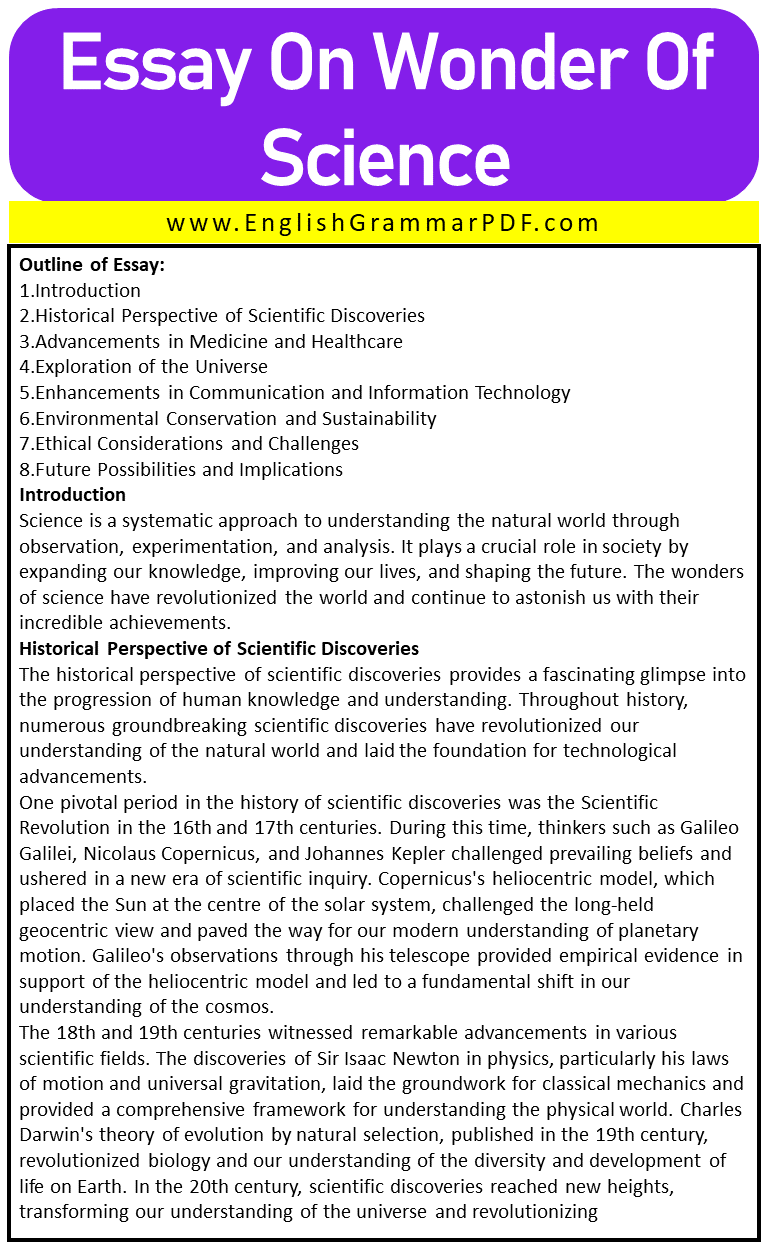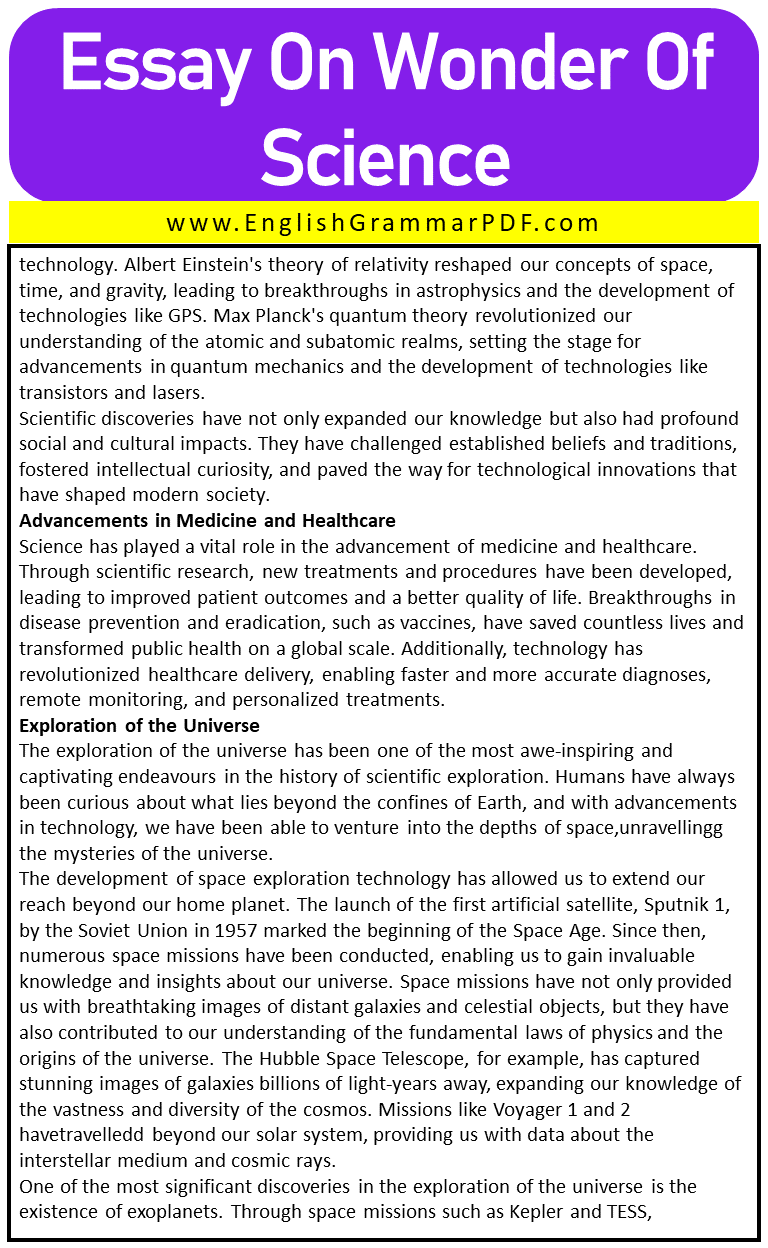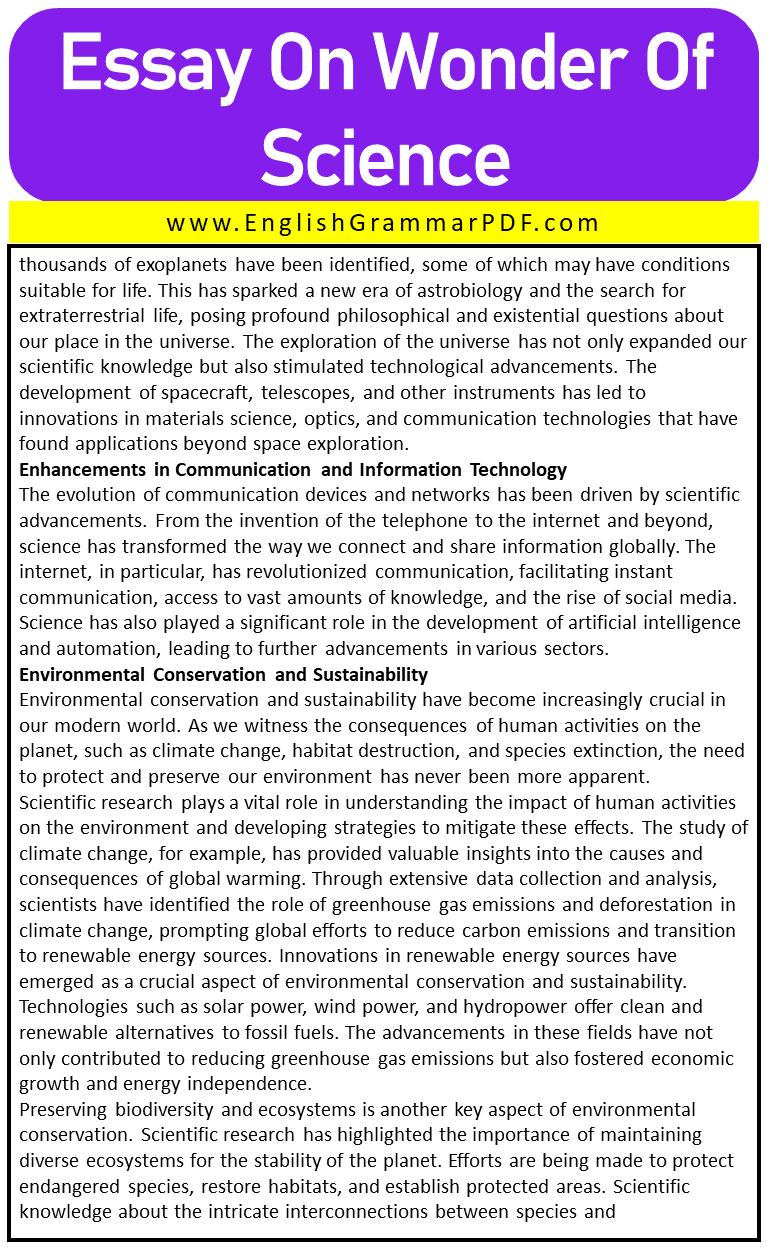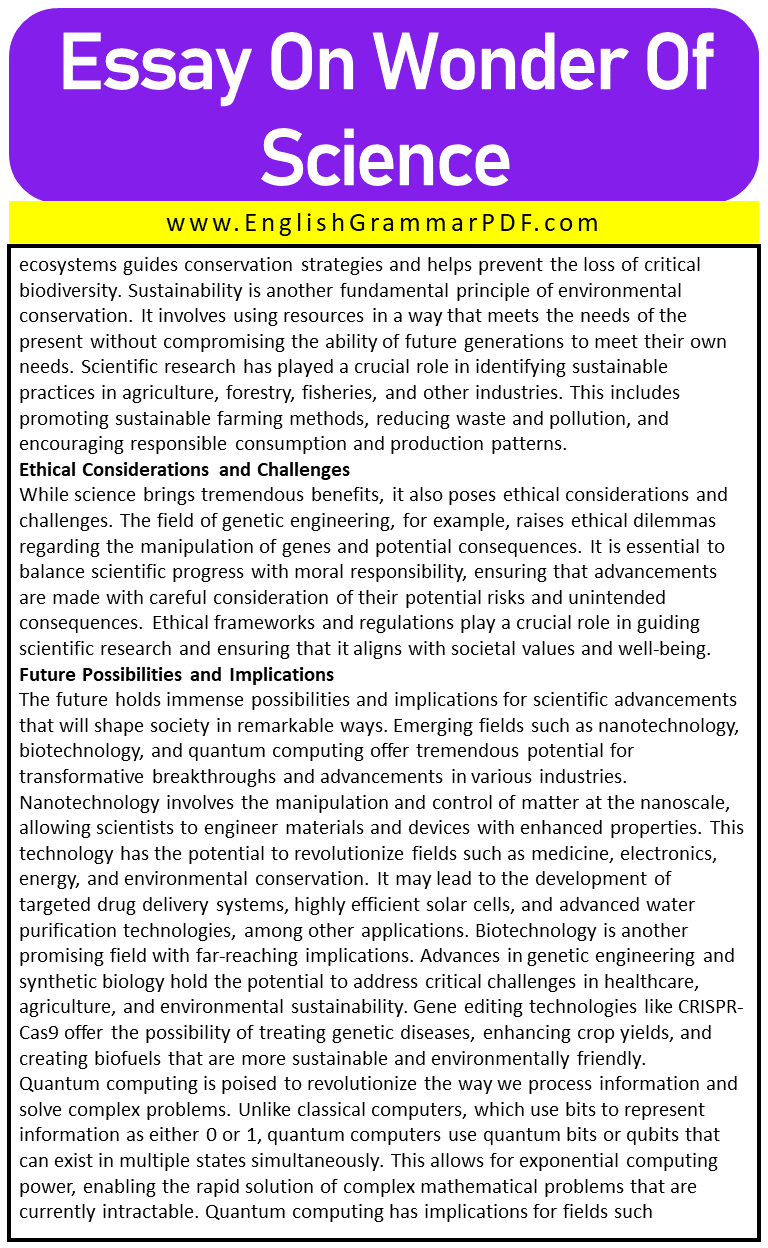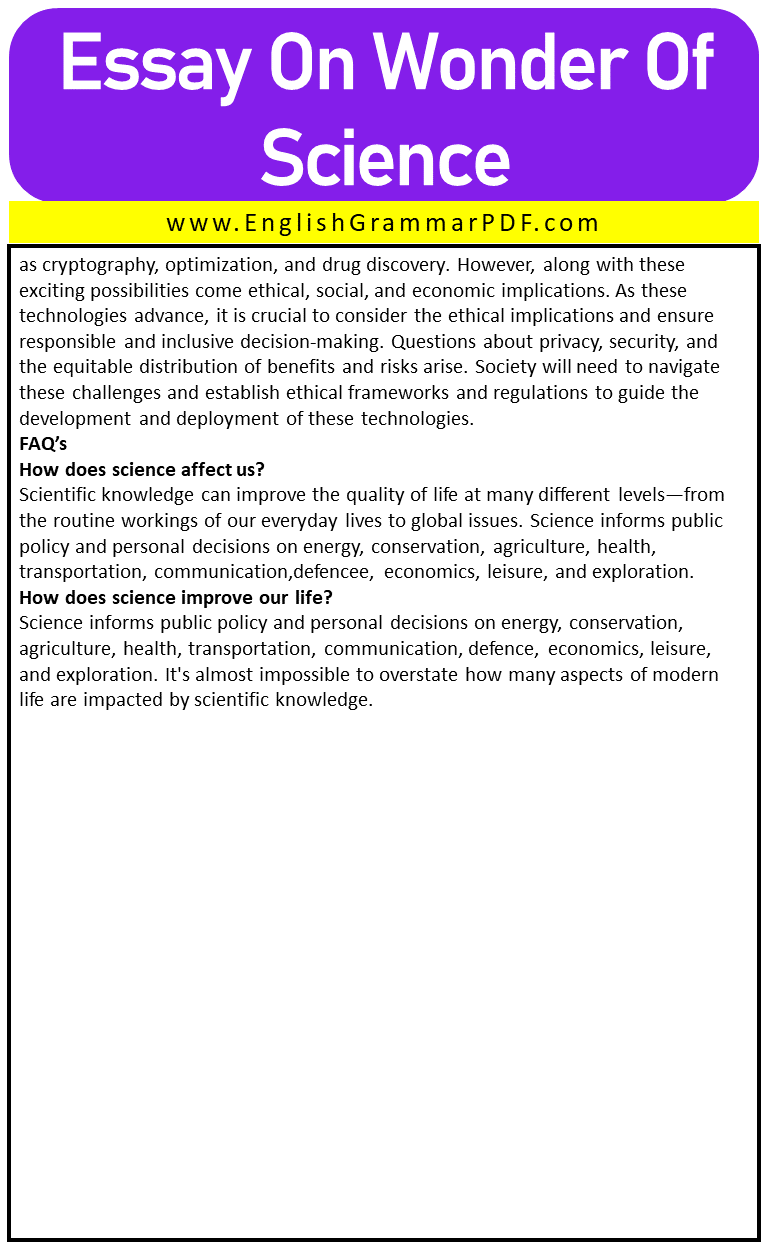Essay On Wonder Of Science
Outline of Essay:
- Introduction
- Historical Perspective of Scientific Discoveries
- Advancements in Medicine and Healthcare
- Exploration of the Universe
- Enhancements in Communication and Information Technology
- Environmental Conservation and Sustainability
- Ethical Considerations and Challenges
- Future Possibilities and Implications
Introduction
Science is a systematic approach to understanding the natural world through observation, experimentation, and analysis. It plays a crucial role in society by expanding our knowledge, improving our lives, and shaping the future. The wonders of science have revolutionized the world and continue to astonish us with their incredible achievements.
Historical Perspective of Scientific Discoveries
The historical perspective of scientific discoveries provides a fascinating glimpse into the progression of human knowledge and understanding. Throughout history, numerous groundbreaking scientific discoveries have revolutionized our understanding of the natural world and laid the foundation for technological advancements.
One pivotal period in the history of scientific discoveries was the Scientific Revolution in the 16th and 17th centuries. During this time, thinkers such as Galileo Galilei, Nicolaus Copernicus, and Johannes Kepler challenged prevailing beliefs and ushered in a new era of scientific inquiry. Copernicus’s heliocentric model, which placed the Sun at the centre of the solar system, challenged the long-held geocentric view and paved the way for our modern understanding of planetary motion. Galileo’s observations through his telescope provided empirical evidence in support of the heliocentric model and led to a fundamental shift in our understanding of the cosmos.
The 18th and 19th centuries witnessed remarkable advancements in various scientific fields. The discoveries of Sir Isaac Newton in physics, particularly his laws of motion and universal gravitation, laid the groundwork for classical mechanics and provided a comprehensive framework for understanding the physical world. Charles Darwin’s theory of evolution by natural selection, published in the 19th century, revolutionized biology and our understanding of the diversity and development of life on Earth. In the 20th century, scientific discoveries reached new heights, transforming our understanding of the universe and revolutionizing technology. Albert Einstein’s theory of relativity reshaped our concepts of space, time, and gravity, leading to breakthroughs in astrophysics and the development of technologies like GPS. Max Planck’s quantum theory revolutionized our understanding of the atomic and subatomic realms, setting the stage for advancements in quantum mechanics and the development of technologies like transistors and lasers.
Scientific discoveries have not only expanded our knowledge but also had profound social and cultural impacts. They have challenged established beliefs and traditions, fostered intellectual curiosity, and paved the way for technological innovations that have shaped modern society.
Advancements in Medicine and Healthcare
Science has played a vital role in the advancement of medicine and healthcare. Through scientific research, new treatments and procedures have been developed, leading to improved patient outcomes and a better quality of life. Breakthroughs in disease prevention and eradication, such as vaccines, have saved countless lives and transformed public health on a global scale. Additionally, technology has revolutionized healthcare delivery, enabling faster and more accurate diagnoses, remote monitoring, and personalized treatments.
Exploration of the Universe
The exploration of the universe has been one of the most awe-inspiring and captivating endeavours in the history of scientific exploration. Humans have always been curious about what lies beyond the confines of Earth, and with advancements in technology, we have been able to venture into the depths of space,unravellingg the mysteries of the universe.
The development of space exploration technology has allowed us to extend our reach beyond our home planet. The launch of the first artificial satellite, Sputnik 1, by the Soviet Union in 1957 marked the beginning of the Space Age. Since then, numerous space missions have been conducted, enabling us to gain invaluable knowledge and insights about our universe. Space missions have not only provided us with breathtaking images of distant galaxies and celestial objects, but they have also contributed to our understanding of the fundamental laws of physics and the origins of the universe. The Hubble Space Telescope, for example, has captured stunning images of galaxies billions of light-years away, expanding our knowledge of the vastness and diversity of the cosmos. Missions like Voyager 1 and 2 havetravelledd beyond our solar system, providing us with data about the interstellar medium and cosmic rays.
One of the most significant discoveries in the exploration of the universe is the existence of exoplanets. Through space missions such as Kepler and TESS, thousands of exoplanets have been identified, some of which may have conditions suitable for life. This has sparked a new era of astrobiology and the search for extraterrestrial life, posing profound philosophical and existential questions about our place in the universe. The exploration of the universe has not only expanded our scientific knowledge but also stimulated technological advancements. The development of spacecraft, telescopes, and other instruments has led to innovations in materials science, optics, and communication technologies that have found applications beyond space exploration.
Enhancements in Communication and Information Technology
The evolution of communication devices and networks has been driven by scientific advancements. From the invention of the telephone to the internet and beyond, science has transformed the way we connect and share information globally. The internet, in particular, has revolutionized communication, facilitating instant communication, access to vast amounts of knowledge, and the rise of social media. Science has also played a significant role in the development of artificial intelligence and automation, leading to further advancements in various sectors.
Environmental Conservation and Sustainability
Environmental conservation and sustainability have become increasingly crucial in our modern world. As we witness the consequences of human activities on the planet, such as climate change, habitat destruction, and species extinction, the need to protect and preserve our environment has never been more apparent.
Scientific research plays a vital role in understanding the impact of human activities on the environment and developing strategies to mitigate these effects. The study of climate change, for example, has provided valuable insights into the causes and consequences of global warming. Through extensive data collection and analysis, scientists have identified the role of greenhouse gas emissions and deforestation in climate change, prompting global efforts to reduce carbon emissions and transition to renewable energy sources. Innovations in renewable energy sources have emerged as a crucial aspect of environmental conservation and sustainability. Technologies such as solar power, wind power, and hydropower offer clean and renewable alternatives to fossil fuels. The advancements in these fields have not only contributed to reducing greenhouse gas emissions but also fostered economic growth and energy independence.
Preserving biodiversity and ecosystems is another key aspect of environmental conservation. Scientific research has highlighted the importance of maintaining diverse ecosystems for the stability of the planet. Efforts are being made to protect endangered species, restore habitats, and establish protected areas. Scientific knowledge about the intricate interconnections between species and ecosystems guides conservation strategies and helps prevent the loss of critical biodiversity. Sustainability is another fundamental principle of environmental conservation. It involves using resources in a way that meets the needs of the present without compromising the ability of future generations to meet their own needs. Scientific research has played a crucial role in identifying sustainable practices in agriculture, forestry, fisheries, and other industries. This includes promoting sustainable farming methods, reducing waste and pollution, and encouraging responsible consumption and production patterns.
Ethical Considerations and Challenges
While science brings tremendous benefits, it also poses ethical considerations and challenges. The field of genetic engineering, for example, raises ethical dilemmas regarding the manipulation of genes and potential consequences. It is essential to balance scientific progress with moral responsibility, ensuring that advancements are made with careful consideration of their potential risks and unintended consequences. Ethical frameworks and regulations play a crucial role in guiding scientific research and ensuring that it aligns with societal values and well-being.
Future Possibilities and Implications
The future holds immense possibilities and implications for scientific advancements that will shape society in remarkable ways. Emerging fields such as nanotechnology, biotechnology, and quantum computing offer tremendous potential for transformative breakthroughs and advancements in various industries.
Nanotechnology involves the manipulation and control of matter at the nanoscale, allowing scientists to engineer materials and devices with enhanced properties. This technology has the potential to revolutionize fields such as medicine, electronics, energy, and environmental conservation. It may lead to the development of targeted drug delivery systems, highly efficient solar cells, and advanced water purification technologies, among other applications. Biotechnology is another promising field with far-reaching implications. Advances in genetic engineering and synthetic biology hold the potential to address critical challenges in healthcare, agriculture, and environmental sustainability. Gene editing technologies like CRISPR-Cas9 offer the possibility of treating genetic diseases, enhancing crop yields, and creating biofuels that are more sustainable and environmentally friendly.
Quantum computing is poised to revolutionize the way we process information and solve complex problems. Unlike classical computers, which use bits to represent information as either 0 or 1, quantum computers use quantum bits or qubits that can exist in multiple states simultaneously. This allows for exponential computing power, enabling the rapid solution of complex mathematical problems that are currently intractable. Quantum computing has implications for fields such as cryptography, optimization, and drug discovery. However, along with these exciting possibilities come ethical, social, and economic implications. As these technologies advance, it is crucial to consider the ethical implications and ensure responsible and inclusive decision-making. Questions about privacy, security, and the equitable distribution of benefits and risks arise. Society will need to navigate these challenges and establish ethical frameworks and regulations to guide the development and deployment of these technologies.
FAQ’s
How does science affect us?
Scientific knowledge can improve the quality of life at many different levels—from the routine workings of our everyday lives to global issues. Science informs public policy and personal decisions on energy, conservation, agriculture, health, transportation, communication,defencee, economics, leisure, and exploration.
How does science improve our life?
Science informs public policy and personal decisions on energy, conservation, agriculture, health, transportation, communication, defence, economics, leisure, and exploration. It’s almost impossible to overstate how many aspects of modern life are impacted by scientific knowledge.
Explore More Essays:
Download the PDF of the Essay:

